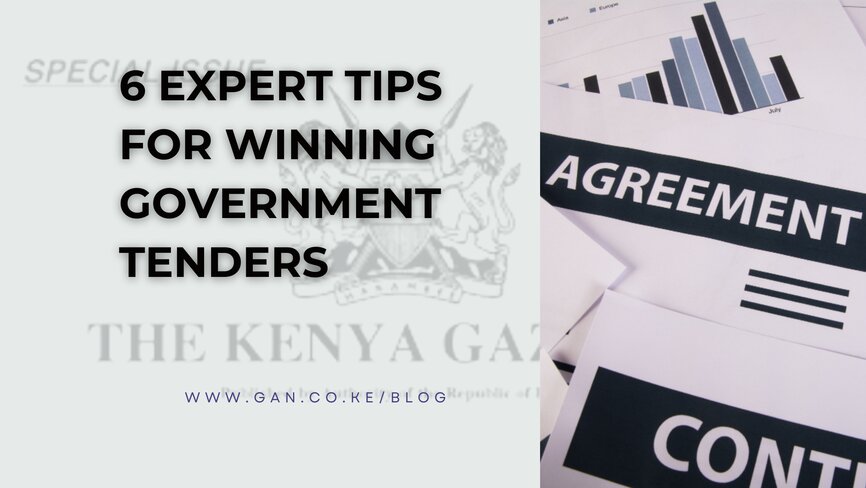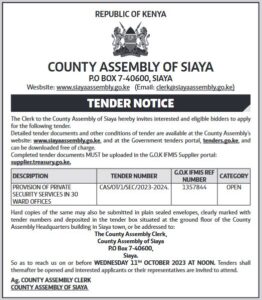
Winning government tenders in Kenya can be a game-changer for businesses, offering a substantial revenue stream and a seal of credibility. However, the process is competitive and requires careful preparation. This guide provides a detailed roadmap on how to apply for and win government tenders in Kenya.
Understanding Government Tenders
A government tender is an invitation to suppliers to submit bids to provide goods, services, or works. In Kenya, tenders are governed by the Public Procurement and Asset Disposal Act, 2015, which ensures transparency, fairness, and competitiveness in the procurement process.
Steps to Apply for a Government Tender in Kenya

Step 1: Business Registration and Compliance
Before you can bid for a government tender, your business must be legally registered and compliant with Kenyan laws. This includes:
- Registering your business: Ensure your business is registered with the Registrar of Companies.
- Tax Compliance: Obtain a valid Tax Compliance Certificate from the Kenya Revenue Authority (KRA).
- Business Permits: Secure the necessary business permits and licenses from local authorities.
- Professional Certifications: Obtain any required professional certifications relevant to your industry.
Trending Right Now: Top 9 Reputable IT Consultants in Kenya for 2024
Step 2: Understanding Tender Notices
Government tenders are advertised through various platforms:
- Kenya Gazette: The official government publication.
- Government Websites: Such as the Public Procurement Information Portal (PPIP) and specific ministry or agency websites.
- Newspapers: Leading dailies like the Daily Nation and The Standard.
- E-Procurement Systems: Such as the Integrated Financial Management Information System (IFMIS).
Step 3: Identifying Relevant Tenders
Monitor these platforms regularly to identify tenders that match your business capabilities. Pay attention to the following details in tender notices:
- Scope of Work: Understand the specific requirements and deliverables.
- Eligibility Criteria: Ensure your business meets all the qualifications.
- Submission Deadlines: Note the closing date for tender submissions
Step 4: Purchasing Tender Documents
Once you identify a relevant tender, purchase the tender documents from the issuing authority. These documents usually contain:
- Terms of Reference (TOR): Detailed description of the required services or goods.
- Evaluation Criteria: How bids will be assessed.
- Bid Submission Forms: Official forms that need to be filled and submitted.
- Conditions of Contract: Terms and conditions governing the tender.
Step 5: Preparing Your Bid
Preparing a bid involves compiling a comprehensive proposal that addresses all the requirements outlined in the tender documents. Key elements include:
- Executive Summary: A brief overview of your bid, highlighting your unique selling points.
- Technical Proposal: Detailed description of how you will meet the tender requirements, including methodologies, timelines, and staffing.
- Financial Proposal: A detailed cost breakdown of your services or goods.
- Compliance Documents: Copies of your business registration, tax compliance certificate, and other relevant permits or certifications.
- Experience and References: Documentation of your previous experience and client references.
Step 6: Submitting Your Bid
Ensure your bid is submitted before the deadline. Most tenders require physical submission to the procuring entity’s offices, while some allow electronic submissions through platforms like IFMIS. Follow the submission instructions carefully, ensuring all required documents are included and properly formatted.
Step 7: Attending Tender Openings
Tender openings are public events where submitted bids are opened and read out. Attending these sessions can give you insights into the competition and the procurement process. Details of the tender opening are usually provided in the tender notice.
Step 8: Evaluation and Award
After the tender opening, bids are evaluated based on the criteria outlined in the tender documents. This process includes:
- Preliminary Evaluation: Checking for completeness and compliance with submission requirements.
- Technical Evaluation: Assessing the technical aspects of the bids.
- Financial Evaluation: Comparing the financial proposals.
Successful bidders are notified through an award letter, while unsuccessful bidders are informed of the decision and can request debriefing to understand why their bid was not successful.
Tips for Winning Government Tenders

Build a Strong Portfolio
Having a solid track record of successfully completed projects can significantly boost your chances. Ensure you document your work and gather client testimonials.
Network and Collaborate
Establish relationships with key stakeholders in the procurement process. Attend industry events and workshops to stay informed about upcoming tenders and best practices.
Stay Compliant
Regularly update your compliance documents and ensure they are always valid. Non-compliance can lead to automatic disqualification.
Be Competitive
Price your bids competitively, but ensure they are realistic and sustainable. Demonstrate value for money by highlighting your efficiency, quality, and expertise.
Pay Attention to the Detail
Ensure your bid is meticulously prepared, with all required documents and information provided. A single missing document can lead to disqualification.
Seek Feedback
If you are unsuccessful, request feedback to understand where you can improve. Use this information to strengthen future bids.
Conclusion
Applying for and winning government tenders in Kenya requires careful planning, thorough preparation, and strategic execution. By understanding the tender process, maintaining compliance, and continually improving your bid proposals, you can enhance your chances of securing lucrative government contracts. Stay proactive, keep learning, and remain persistent in your efforts.
By following these steps and tips, your business can successfully navigate the complexities of government procurement and achieve significant growth through government tenders.







